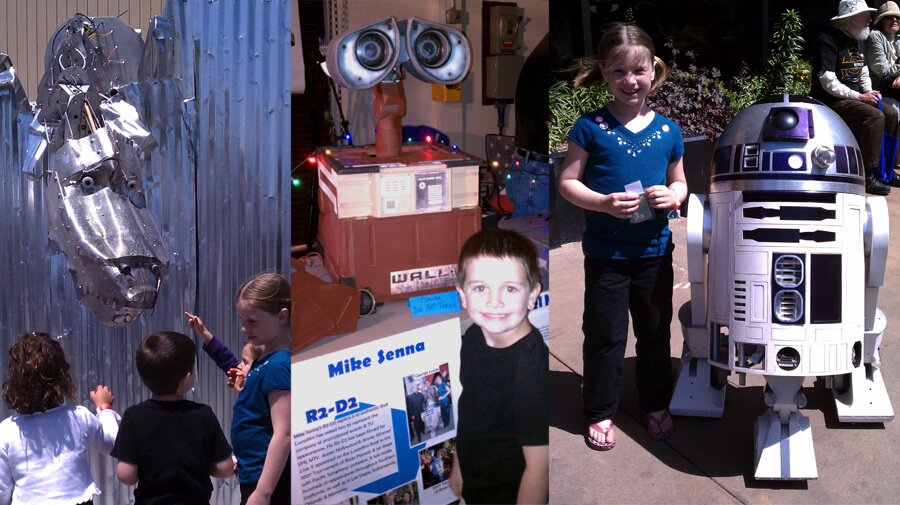When seeking satisfaction in work and life, it's important to remember that every passion doesn't need to have a monetary return on investment.

This week my Facebook memories surfaced photos from our first-ever Maker Faire in San Francisco, hosted by O’Riley Media and Make Magazine. It was similar to what you might expect at a County Fair, except everything was bigger, better, more fantastical, and hand-crafted, handmade, or built by hand.
- Engineers and artisans were showing off giant metal sculptures, huge flame guns, carved wooden bikes, complex Lego displays, a life-size version of the game Mousetrap, and contraptions that look like they had just come back from Burning Man.
- Crafts people and makers were selling everything from knitted/crocheted items and robots (and pieces to build robots) to technical wonders with lights and sounds, to pottery and gorgeous wood products.
- Passionate creatives were inviting attendees to participate in activities and experiences that ranged from riding a human/bike-powered carnival ride, making giant bubbles, and doing arts and crafts.
Our favorite Maker Faire entry was the R2-D2 Club — members were showing working, life-size, remote control R2-D2 robots that interacted and “played” with the kids! So cool!

Maker Faire gives makers of all types the opportunity to share their hobbies and passions with the public — and it’s clear that many of these folks are pouring their hearts and souls (and a lot of money) into their creations.
As our kids explored, marveled, and played, Brian and I chatted up the makers…
We learned that making and selling goods was the full-time business for most of the crafters. For many of the makers, however, their creations had nothing to do with their primary business or job — it’s simply a fun, non-digital, creative hobby they love. In fact, when I asked a few of the artisans behind the giant sculptures if they sold them, they said no. They weren’t interested in turning something meant for play and fun into something tied to work and money.
That completely hit home.
Should It Be Monetized?
When I launched my blog Inspired Imperfection, I wanted a place to be able to share things happening in my life that had nothing to do with my business.
- I didn’t have a big vision for the brand or the website.
- I didn’t know if I wanted it to become a multi-author blog.
- I didn’t know if I wanted to create products or offers around it or if/how I wanted to monetize it.
So, I snagged all of the social media brand handles just in case and for a while juggled my personal social accounts and the accounts for that brand. And I kicked around the idea of monetization a lot. After all, if it was making money, it would justify me spending more time creating content for that site, which I want to do.
I even created a journal and planner I was going to launch under that brand.
But over time, I realized something: Inspired Imperfection is my place to play and have fun. It’s become a place to document our family adventures (although I’m now 300+ adventures behind). And I don’t want to monetize it beyond some basic ads that don’t get in the way of the content, because I don’t want the pressure of monetization to ruin something I enjoy.
For freelancers and those with an entrepreneurial spirit, there is an unspoken pressure/drive to monetize everything. But you don’t have to monetize everything.
You can have hobbies you do purely for fun. You can create beautiful works of art without building a business around them. You can help others without making a buck. There is nothing wrong with that.
The trick to removing the pressure to turn a hobby into a business is generating enough revenue and success in your primary business that you don’t need additional income. When your freelance packaging and pricing are dialed in, you have all the clients you need, your pipeline is full of quality leads, and you’re earning what you deserve, playtime remains playtime.
What Is Driving The Need To Monetize?
This is a conversation I have with clients on a regular basis. I do quite a bit of consulting with small businesses on brand positioning, digital strategy, content design, and product positioning. I also work with clients to help them launch new offers and enter new markets. Often, I fully support the new idea, especially when it:
- Accelerates progress toward their big vision and goal
- Enhances and further supports their core message and brand
- Adds visibility and/or credibility to their brand
- Aligns with their core values, mission, and purpose
But sometimes I take a step back and ask, “Why do you want to do this? Why do you feel the need to monetize this?”
Not surprisingly, these questions lead to clients sharing that they don’t really want to start another business or monetize the new “thing” They have been feeling stressed about it, they’re only doing it because of outside pressure from other people, and they’re worried that turning it into a job will suck all the fun out of it.
If you’re a freelancer or you have an entrepreneurial spirit, you see the potential in everything.
It’s easy for you to recognize talent, craftsmanship, quality products, and smarts and see what it could become if branded, turned into a business, and properly marketed — and that can be irresistible. I know, I’ve been there on more than one occasion. But, if I’ve learned anything, it’s that you don’t have to monetize everything.
You can do something because you love it.
You can do it because it’s fun and it brings you joy.
You can do it because you get lost in it, all other things fade away, and it brings you peace.
And, you can spend a lot of money on it and give whatever you create away.
There’s no guilt in that. There’s no shame. There’s only happiness and satisfaction and joy.
I know that when I make time for pure play and creative, non-digital hobbies, I come back to client work more creative, more energized, and more inspired.
So the next time you experience Bright Shiny Object Syndrome and start thinking about monetizing something you love, think about WHY you’re considering that path and consider the impact monetization will have on the joy it brings you. This way, regardless of the decision you make, you can feel great about seeking satisfaction.
